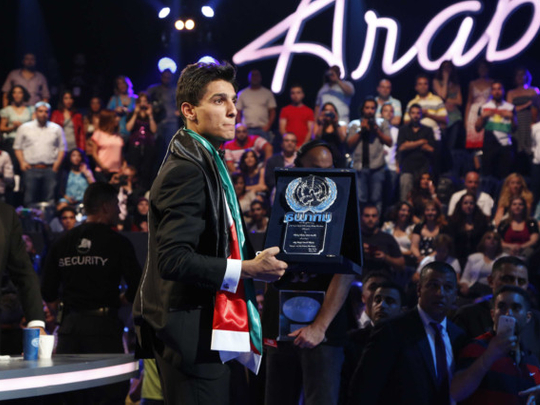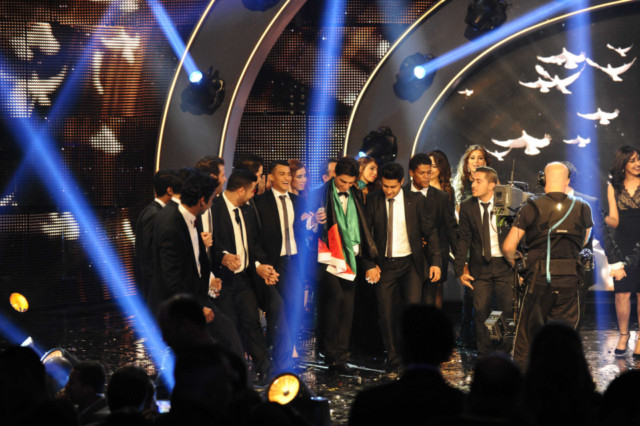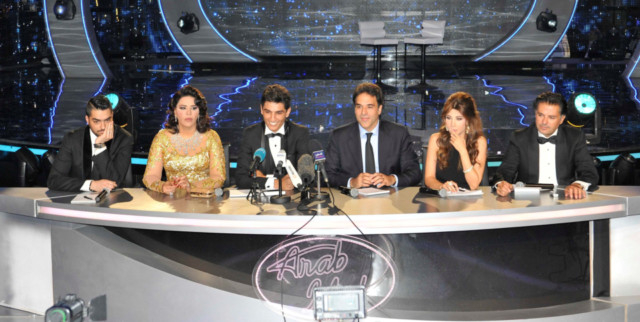
On Saturday night a 23-year-old Palestinian man, raised in a refugee camp in the Gaza Strip, one of the most populous and impoverished regions in the world, achieved something many Arab politicians have failed to: Unity.
With his pitch-perfect voice, wedding singer Mohammad Assaf managed to rally the Palestinian people — regardless of their political affiliations or views — behind him. Nothing has united the Palestinian people, locked in deep political differences in the West Bank and Gaza Strip in the past few years, quite like Assaf, who on Saturday night clinched the title on the second season of Arab Idol, broadcast around the Arab world from Beirut by MBC.
“I will carry a message of love and peace to the Arab world and to the whole globe,” a tired Assaf told tabloid! in an interview on Sunday morning, having slept little since his win the night before. He and his fellow finalists — Ahmad Jamal from Egypt and Farah Yousuf from Syria — had partied into the early hours of Sunday morning with the show’s hosts and contestants.
On Sunday, Assaf was preparing to return to Gaza with his parents, who had been with their son. “I will carry the just Palestinian cause to the world through speaking of it. Because I am son of the Palestinian people, and I live their suffering.”
Asked about possible obstacles in his return by the Hamas government in Gaza or any special arrangements, he said: “I don’t have information. I am going back to Gaza because I am the son of this people, and son of Palestine. I have lived in Gaza all my life and I am going back there because people want me there.”
The second he was announced the winner on the show, Assaf fell to his knees, touching the ground with his forehead and thanking God erupted in the Gaza Strip, West Bank and Nazareth, which is now part of Israel.
The handsome, tuxedo-clad singer dedicated his win to “the Palestinian people, who have been suffering for more than 60 years from [the Israeli] occupation”.
He wins a recording contract with Platinum Records and a car, a 2013 Chevrolet Camaro.
As his name was read out, his mother — wearing a traditional Palestinian embroidered dress, her shoulders wrapped in the black, green, white and red of the national flag — burst into tears of joy. Assaf, one of seven children who began singing at age five, thanked his mother, a teacher, and his retired father.
Spontaneous cele-brations broke out across Gaza and in the West Bank, where tens of thousands took to the streets, cheering and dancing, car radios blasting the traditional Palestinian song that propelled him to victory as people handed out sweets to passersby.
A Ramallah-based public relations firm announced plans to host Assaf for a concert and celebration party in July.
“Assaf represents the embodiment of hope and ambition,” Mazen Hayek, MBC’s spokesman, told tabloid!.
Referring to the difficult circumstances in which Assaf was raised under occupation in a refugee camp, Hayek said: “He [Assaf] never surrendered. He doesn’t know surrender.”
Asked to confirm reports that Assaf got 60 million votes, Hayek replied: “I can’t reveal numbers, but all I can say is that his votes were in millions, and there is a considerable difference with the second contender.”
A person familiar with life in the Khan Younis refugee camp where Assaf lives told tabloid! Assaf “grew up not knowing what childhood means. The best play area for him to play was a narrow road not more than half a metre wide in the camp”.
Praised by the jury and fans for “singing like a nightingale”, Assaf said his win was as much of a surprise to him as to his countrymen. “I believe God has facilitated everything, and I believe that all was from God.”
At the start of the competition in March this year, the four-member jury — Lebanese pop stars Nancy Ajram and Ragheb Alama, Emirati singer Ahlam and Egyptian producer Hassan Al Shafie — were visiting different Arab cities, including Cairo, to audition potential stars. Assaf arrived late because of what he then said were “some problems at the crossing point” between Gaza and Egypt that took him “two days”.
Another man in the crowd— Assaf remembers him as Ramadan Abu Nahla — offered Assaf his place, though Assaf doesn’t like to call it luck or coincidence. Assaf was the last person to perform for the jury, who unanimously voted for him to move to the second phase.
As for his future plans, Assaf said “there will many things, God willing, in the next few months. It is premature to talk about them.” However, he said he will start working on an album after Ramadan. Popular Saudi Arabian singer Rashid Al Majid, who has big stake in Platinum Records, will supervise the album.
In addition to receiving the Arab Idol trophy, Assaf was appointed as the first UNRWA Regional Youth Ambassador for Palestine Refugees by Filippo Grandi, the Commissioner General of the United Nations Relief and Works Agency, which operates the Khan Younis refugee camp. Grandi said that “all Palestinians share in his success”.
Palestinian President Mahmoud Abbas declared the singer an honorary ambassador. “I congratulate the talented singer Mohammad Assaf ... who conveyed the message of the Palestinian people to the Arab nation through his art,” Abbas said in a statement distributed by the official Wafa news agency.
As Assaf’s popularity on Arab Idol grew, politicians tried to latch on to it, with the Western-backed Abbas calling Assaf last month to congratulate him on his strong showing and later, in a statement, urging people across the region to vote for the singer.
There were even congratulations from Israel, with the army’s Arabic spokesman Avichai Adraee hailing his victory on Twitter.
And the left-leaning Haaretz newspaper also hailed his success, saying: “A Palestinian hero is born.”
Hamas at first seemed critical of the “Arab Idol” fever sweeping Gaza, with a spokesman saying last month that the name and idea of the show are blasphemous.
However, Hamas is known for not going against public opinion. In a sign of a shift, a Hamas lawmaker in Gaza, Yehiyeh Moussa, last week praised Assaf as the “ambassador for Palestinian art”.
Some religious leaders, though, remained harshly critical. Mohammad Salim, delivering a sermon on Friday at Islam’s third holiest shrine, the Al Aqsa Mosque in Occupied Jerusalem, said Palestinians lost sight of their struggle for independence by getting preoccupied with the show.
“Voting for songs and immorality, evil and sin is not only forbidden, it is a crime against the cause of our people,” he said.
With inputs from agencies














